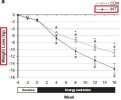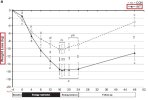Considering that the loss of body fat only occurs in the long term and that the significant variations in weight, when starting a diet, are due to the loss of muscle glycogen and intra and extracellular water, the individual who is willing to lose fat You will need to stay on a diet for a considerable amount of time.
Only about 20% of people who lose weight actually manage to stay slimmer for at least a year after that loss (1). The reason for this is due to some factors, such as adaptive thermogenesis, the drop in non-exercise activity thermogenesis (NEAT) (any and all activities performed on a day-to-day basis that have nothing to do with resisted physical activity and aerobic activities, for example) and the physiological adaptations of appetite and satiety control (2, 3).
Knowing this, intelligently manipulating calories over the weeks can lead the individual to a greater loss of weight and body fat, saving more lean mass, in addition to being less exposed to hunger, a drop in performance during training and also the throughout the day. And this is exactly what was demonstrated in the MATADOR Study (Minimizing Adaptive Thermogenesis And Deactivating Obesity Rebound) (4).
When we talk about fat loss, we know that the first thing we need to consider for this to actually occur is what we call a “calorie deficit”, which is nothing more than eating fewer calories than you expend. This can be achieved by manipulating diet and physical activity (eating less and/or increasing training intensity and volume).
Knowing this, many people already tend to go straight into a very low-calorie diet (>1000kcal/day deficit). That is, if the person has a total energy expenditure (TEE) around 2500kcal/day, then he/she would start with a diet below 1500kcal/day. This can bring more significant results. However, this practice can become unsustainable in the long term, and thus less effective. It is always important to point out here that fat loss happens chronically. The significant variation in weight that occurs at the beginning of a fat loss plan is mainly due to the loss of muscle glycogen and intra and extracellular water.
In 2017, Byrne et al carried out the MATADOR Study (4), separating 51 obese men into two groups, with group [1] undergoing continuous calorie restriction, that is, they gradually reduced their calories every 2 weeks; and group [2], who would do intermittent calorie restriction, that is, 2 weeks consuming fewer calories, followed by 2 weeks consuming calories similar to their GET. Both groups had an initial 4-week phase undergoing an adaptation before going into deficit, however, 47 men followed in the study according to the criteria used by the researchers. The caloric deficit of both groups was 33% in relation to the GET and this deficit was recalculated every 4 weeks as weight loss occurred. The breakdown of macronutrients was similar between the groups: about 15-20% protein, 25-30% lipid, and 50-60% carbohydrate.
RESULT: The group [2], which restricted calories intermittently, achieved greater weight and body fat loss, without greater loss of lean mass, and also had less impact on their resting energy expenditure (REE). In addition, the researchers also assessed the maintenance of this weight loss 8 weeks and 6 months later. Both groups remained with stable weight in the first two weeks, but only group [2] managed to remain thinner at 8 weeks post-intervention. After 6 months, weight regain was variable between the two groups, but group [2] still had less weight and less body fat.
CONCLUSION: From the authors themselves: “INTERMITENT ENERGY RESTRICTION resulted in greater weight loss (fat loss) without greater loss of lean mass, attenuation of REE reduction, and superior weight loss after 6 months compared with a CONTINUOUS ENERGY RESTRICTION. While adaptive reductions in REE were attenuated using this 2:2 intermittent approach, it is possible that the greater weight loss in the INTERMITTENT group could also be due to reduced compensation in other energy functions, such as the thermic effect of food and energy expenditure. of the activity”.
--
References:
1 - Rena R Wing, Suzanne Phelan, Long-term weight loss maintenance, The American Journal of Clinical Nutrition, Volume 82, Issue 1, July 2005, Pages 222S–225S, https://doi.org/10.1093/ajcn/82.1 .222S
2 - Dulloo AG, Jacquet J, Montani JP, Schutz Y. Adaptive thermogenesis in human body weight regulation: more of a concept than a measurable entity? Obesity Reviews: an Official Journal of the International Association for the Study of Obesity. 2012 Dec;13 Suppl 2:105-121. DOI: 10.1111/j.1467-789x.2012.01041.x.
3 - Trexler, E.T., Smith-Ryan, A.E. & Norton, L.E. Metabolic adaptation to weight loss: implications for the athlete. J Int Soc Sports Nutr 11, 7 (2014). https://doi.org/10.1186/1550-2783-11-7
4 - Byrne, N., Sainsbury, A., King, N. et al. Intermittent energy restriction improves weight loss efficiency in obese men: the MATADOR study. Int J Obes 42, 129–138 (2018). https://doi.org/10.1038/ijo.2017.206
Image 1

Image 2

Only about 20% of people who lose weight actually manage to stay slimmer for at least a year after that loss (1). The reason for this is due to some factors, such as adaptive thermogenesis, the drop in non-exercise activity thermogenesis (NEAT) (any and all activities performed on a day-to-day basis that have nothing to do with resisted physical activity and aerobic activities, for example) and the physiological adaptations of appetite and satiety control (2, 3).
Knowing this, intelligently manipulating calories over the weeks can lead the individual to a greater loss of weight and body fat, saving more lean mass, in addition to being less exposed to hunger, a drop in performance during training and also the throughout the day. And this is exactly what was demonstrated in the MATADOR Study (Minimizing Adaptive Thermogenesis And Deactivating Obesity Rebound) (4).
When we talk about fat loss, we know that the first thing we need to consider for this to actually occur is what we call a “calorie deficit”, which is nothing more than eating fewer calories than you expend. This can be achieved by manipulating diet and physical activity (eating less and/or increasing training intensity and volume).
Knowing this, many people already tend to go straight into a very low-calorie diet (>1000kcal/day deficit). That is, if the person has a total energy expenditure (TEE) around 2500kcal/day, then he/she would start with a diet below 1500kcal/day. This can bring more significant results. However, this practice can become unsustainable in the long term, and thus less effective. It is always important to point out here that fat loss happens chronically. The significant variation in weight that occurs at the beginning of a fat loss plan is mainly due to the loss of muscle glycogen and intra and extracellular water.
In 2017, Byrne et al carried out the MATADOR Study (4), separating 51 obese men into two groups, with group [1] undergoing continuous calorie restriction, that is, they gradually reduced their calories every 2 weeks; and group [2], who would do intermittent calorie restriction, that is, 2 weeks consuming fewer calories, followed by 2 weeks consuming calories similar to their GET. Both groups had an initial 4-week phase undergoing an adaptation before going into deficit, however, 47 men followed in the study according to the criteria used by the researchers. The caloric deficit of both groups was 33% in relation to the GET and this deficit was recalculated every 4 weeks as weight loss occurred. The breakdown of macronutrients was similar between the groups: about 15-20% protein, 25-30% lipid, and 50-60% carbohydrate.
RESULT: The group [2], which restricted calories intermittently, achieved greater weight and body fat loss, without greater loss of lean mass, and also had less impact on their resting energy expenditure (REE). In addition, the researchers also assessed the maintenance of this weight loss 8 weeks and 6 months later. Both groups remained with stable weight in the first two weeks, but only group [2] managed to remain thinner at 8 weeks post-intervention. After 6 months, weight regain was variable between the two groups, but group [2] still had less weight and less body fat.
CONCLUSION: From the authors themselves: “INTERMITENT ENERGY RESTRICTION resulted in greater weight loss (fat loss) without greater loss of lean mass, attenuation of REE reduction, and superior weight loss after 6 months compared with a CONTINUOUS ENERGY RESTRICTION. While adaptive reductions in REE were attenuated using this 2:2 intermittent approach, it is possible that the greater weight loss in the INTERMITTENT group could also be due to reduced compensation in other energy functions, such as the thermic effect of food and energy expenditure. of the activity”.
--
References:
1 - Rena R Wing, Suzanne Phelan, Long-term weight loss maintenance, The American Journal of Clinical Nutrition, Volume 82, Issue 1, July 2005, Pages 222S–225S, https://doi.org/10.1093/ajcn/82.1 .222S
2 - Dulloo AG, Jacquet J, Montani JP, Schutz Y. Adaptive thermogenesis in human body weight regulation: more of a concept than a measurable entity? Obesity Reviews: an Official Journal of the International Association for the Study of Obesity. 2012 Dec;13 Suppl 2:105-121. DOI: 10.1111/j.1467-789x.2012.01041.x.
3 - Trexler, E.T., Smith-Ryan, A.E. & Norton, L.E. Metabolic adaptation to weight loss: implications for the athlete. J Int Soc Sports Nutr 11, 7 (2014). https://doi.org/10.1186/1550-2783-11-7
4 - Byrne, N., Sainsbury, A., King, N. et al. Intermittent energy restriction improves weight loss efficiency in obese men: the MATADOR study. Int J Obes 42, 129–138 (2018). https://doi.org/10.1038/ijo.2017.206
Image 1

Image 2



